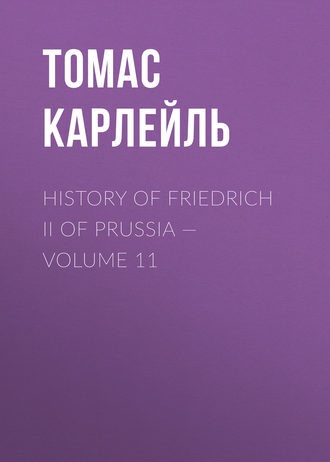
Томас Карлейль
History of Friedrich II of Prussia — Volume 11
Chapter IV. — VOLTAIRE'S FIRST INTERVIEW WITH FRIEDRICH
At Wesel, in the rear of all this travelling and excitement, Friedrich falls unwell; breaks down there into an aguish feverish distemper, which, for several months after, impeded his movements, would he have yielded to it. He has much business on hand, too,—some of it of prickly nature just now;—but is intent as ever on seeing Voltaire, among the first things. Diligently reading in the Voltaire-Friedrich Correspondence (which is a sad jumble of misdates and opacities, in the common editions), [Preuss (the recent latest Editor, and the only well-informed one, as we said) prints with accuracy; but cannot be read at all (in the sense of UNDERSTOOD) without other light.] this of the aguish condition frequently turns up; "Quartan ague," it seems; occasionally very bad; but Friedrich struggles with it; will not be cheated of any of his purposes by it.
He had a busy fortnight here; busier than we yet imagine. Much employment there naturally is of the usual Inspection sort; which fails in no quarter of his Dominions, but which may be particularly important here, in these disputed Berg-Julich Countries, when the time of decision falls. How he does his Inspections we know;—and there are still weightier matters afoot here, in a silent way, of which we shall have to speak before long, and all the world will speak. Business enough, parts of it grave and silent, going on, and the much that is public, miscellaneous, small: done, all of it, in a rapid-punctual precise manner;—and always, after the crowded day, some passages of Supper with the Sages, to wind up with on melodious terms. A most alert and miscellaneously busy young King, in spite of the ague.
It was in these Cleve Countries, and now as probably as afterwards, that the light scene recorded in Laveaux's poor HISTORY, and in all the Anecdote-Books, transacted itself one day. Substance of the story is true; though the details of it go all at random,—somewhat to this effect:—
"Inspecting his Finance Affairs, and questioning the parties interested, Friedrich notices a certain Convent in Cleve, which appears to have, payable from the Forest-dues, considerable revenues bequeathed by the old Dukes, 'for masses to be said on their behalf.' He goes to look at the place; questions the Monks on this point, who are all drawn out in two rows, and have broken into TE-DEUM at sight of him: 'Husht! You still say those Masses, then?' 'Certainly, your Majesty!'—'And what good does anybody get of them?' 'Your Majesty, those old Sovereigns are to obtain Heavenly mercy by them, to be delivered out of Purgatory by them.'—'Purgatory? It is a sore thing for the Forests, all this while! And they are not yet out, those poor souls, after so many hundred years of praying?' Monks have a fatal apprehension, No. 'When will they be out, and the thing complete?' Monks cannot say. 'Send me a courier whenever it is complete!' sneers the King, and leaves them to their TE-DEUM." [C. Hildebrandt's Modern Edition of the (mostly dubious) Anekdoten und Charakterzuge aus dem Leben Friedrichs des Grossen (and a very ignorant and careless Edition it is; 6 vols. 12mo, Halberstadt, 1829), ii. 160; Laveaus (whom we already cited), Vie de Frederic; &c. &c. Nicolai's Anekdoten alone, which are not included in this Hildebrandt Collection, are of sure authenticity; the rest, occasionally true, and often with a kind of MYTHIC truth in them worth attending to, are otherwise of all degrees of dubiety, down to the palpably false and absurd.]
Mournful state of the Catholic Religion so called! How long must these wretched Monks go on doing their lazy thrice-deleterious torpid blasphemy; and a King, not histrionic but real, merely signify that he laughs at them and it? Meseems a heavier whip than that of satire might be in place here, your Majesty? The lighter whip is easier;—Ah yes, undoubtedly! cry many men. But horrible accounts are running up, enough to sink the world at last, while the heavier whip is lazily withheld, and lazy blasphemy, fallen torpid, chronic, and quite unconscious of being blasphemous, insinuates itself into the very heart's-blood of mankind! Patience, however; the heavy whip too is coming,—unless universal death be coming. King Friedrich is not the man to wield such whip. Quite other work is in store for King Friedrich; and Nature will not, by any suggestion of that terrible task, put him out in the one he has. He is nothing of a Luther, of a Cromwell; can look upon fakirs praying by their rotatory calabash, as a ludicrous platitude; and grin delicately as above, with the approval of his wiser contemporaries. Speed to him on his own course!
What answer Friedrich found to his English proposals,—answer due here on the 24th from Captain Dickens,—I do not pointedly learn; but can judge of it by Harrington's reply to that Despatch of Dickens's, which entreated candor and open dealing towards his Prussian Majesty. Harrington is at Herrenhausen, still with the Britannic Majesty there; both of them much at a loss about their Spanish War, and the French and other aspects upon it: "Suppose his Prussian Majesty were to give himself to France against us!" We will hope, not. Harrington's reply is to the effect, "Hum, drum:—Berg and Julich, say you? Impossible to answer; minds not made up here:—What will his Prussian Majesty do for US?" Not much, I should guess, till something more categorical come from you! His Prussian Majesty is careful not to spoil anything by over-haste; but will wait and try farther to the utmost, Whether England or France is the likelier bargain for him.
Better still, the Prussian Majesty is intent to do something for himself in that Berg-Julich matter: we find him silently examining these Wesel localities for a proper "entrenched Camp," Camp say of 40,000, against a certain contingency that may be looked for. Camp which will much occupy the Gazetteers when they get eye on it. This is one of the concerns he silently attends to, on occasion, while riding about in the Cleve Countries. Then there is another small item of business, important to do well, which is now in silence diligently getting under way at Wesel; which also is of remarkable nature, and will astonish the Gazetteer and Diplomatic circles. This is the affair with the Bishop of Liege, called also the Affair of Herstal, which his Majesty has had privately laid up in the corner of his mind, as a thing to be done during this Excursion. Of which the reader shall hear anon, to great lengths,—were a certain small preliminary matter, Voltaire's Arrival in these parts, once off our hands.
Friedrich's First Meeting with Voltaire! These other high things were once loud in the Gazetteer and Diplomatic circles, and had no doubt they were the World's History; and now they are sunk wholly to the Nightmares, and all mortals have forgotten them,—and it is such a task as seldom was to resuscitate the least memory of them, on just cause of a Friedrich or the like, so impatient are men of what is putrid and extinct:—and a quite unnoticed thing, Voltaire's First Interview, all readers are on the alert for it, and ready to demand of me impossibilities about it! Patience, readers. You shall see it, without and within, in such light as there was, and form some actual notion of it, if you will co-operate. From the circumambient inanity of Old Newspapers, Historical shot-rubbish, and unintelligible Correspondences, we sift out the following particulars, of this First Meeting, or actual Osculation of the Stars.
The Newspapers, though their eyes were not yet of the Argus quality now familiar to us, have been intent on Friedrich during this Baireuth-Cleve Journey, especially since that sudden eclipse of him at Strasburg lately; forming now one scheme of route for him, now another; Newspapers, and even private friends, being a good deal uncertain about his movements. Rumor now ran, since his reappearance in the Cleve Countries, that Friedrich meant to have a look at Holland before going home, And that had, in fact, been a notion or intention of Friedrich's. "Holland? We could pass through Brussels on the way, and see Voltaire!" thought he.
In Brussels this was, of course, the rumor of rumors. As Voltaire's Letters, visibly in a twitter, still testify to us. King of Prussia coming! Madame du Chatelet, the "Princess Tour" (that is, Tour-and-Taxis), all manner of high Dames are on the tiptoe. Princess Tour hopes she shall lodge this unparalleled Prince in her Palace: "You, Madame?" answers the Du Chatelet, privately, with a toss of her head: "His Majesty, I hope, belongs more to M. de Voltaire and me: he shall lodge here, please Heaven!" Voltaire, I can observe, has sublime hostelry arrangements chalked out for his Majesty, in case he go to Paris; which he does n't, as we know. Voltaire is all on the alert, awake to the great contingencies far and near; the Chatelet-Voltaire breakfast-table,—fancy it on those interesting mornings, while the post comes round! [Voltaire, xxii. 238-256 (Letters 22d August-22d September, 1740).]
Alas, in the first days of September,—Friedrich's Letter is dated "Wesel, 2d" (and has the STRASBURD DOGGEREL enclosed in it),—the Brussels Postman delivers far other intelligence at one's door; very mortifying to Madame: "That his Majesty is fallen ill at Wesel; has an aguish fever hanging on him, and only hopes to come:" VOILA, Madame!—Next Letter, Wesel, Monday, 5th September, is to the effect: "Do still much hope to come; to-morrow is my trembling day; if that prove to be off!"—Out upon it, that proves not to be off; that is on: next Letter, Tuesday, September 6th, which comes by express (Courier dashing up with it, say on the Thursday following) is,—alas, Madame!—here it is:—
KING FRIEDRICH TO M. DE VOLTAIRE AT BRUSSELS.
"WESEL, 6th September, 1740. "MY DEAR VOLTAIRE,—In spite of myself, I have to yield to the Quartan Fever, which is more tenacious than a Jansenist; and whatever desire I had of going to Antwerp and Brussels, I find myself not in a condition to undertake such a journey without risk. I would ask of you, then, if the road from Brussels to Cleve would not to you seem too long for a meeting; it is the one means of seeing you which remains to me. Confess that I am unlucky; for now when I could dispose of my person, and nothing hinders me from seeing you, the fever gets its hand into the business, and seems to intend disputing me that satisfaction.
"Let us deceive the fever, my dear Voltaire; and let me at least have the pleasure of embracing you. Make my best excuses [polite, rather than sincere] to Madame the MARQUISE, that I cannot have the satisfaction of seeing her at Brussels. All that are about me know the intention I was in; which certainly nothing but the fever could have made me change.
"Sunday next I shall be at a little Place near Cleve,"—Schloss of Moyland, which, and the route to which, this Courier can tell you of;—"where I shall be able to possess you at my ease. If the sight of you don't cure me, I will send for a Confessor at once. Adieu; you know my sentiments and my heart. [Preuss, OEuvres de Frederic, xxii. 27.] FREDERIC."
After which the Correspondence suddenly extinguishes itself; ceases for about a fortnight,—in the bad misdated Editions even does worse;—and we are left to thick darkness, to our own poor shifts; Dryasdust being grandly silent on this small interest of ours. What is to be done?
PARTICULARS OF FIRST INTERVIEW, ON SEVERE SCRUTINY
Here, from a painful Predecessor whose Papers I inherit, are some old documents and Studies on the subject,—sorrowful collection, in fact, of what poor sparks of certainty were to be found hovering in that dark element;—which do at last (so luminous are certainties always, or "sparks" that will shine steady) coalesce into some feeble general twilight, feeble but indubitable; and even show the sympathetic reader how they were searched out and brought together. We number and label these poor Patches of Evidence on so small a matter; and leave them to the curious:—
No. 1. DATE OF THE FIRST INTERVIEW. It is certain Voltaire did arrive at the little Schloss of Moyland, September 11th, Sunday night,—which is the "Sunday" just specified in Friedrich's Letter. Voltaire had at once decided on complying,—what else?—and lost no time in packing himself: King's Courier on Thursday late; Voltaire on the road on Saturday early, or the night before. With Madame's shrill blessing (not the most musical in this vexing case), and plenty of fuss. "Was wont to travel in considerable style," I am told; "the innkeepers calling him 'Your Lordship' (M. LE COMTE)." Arrives, sure enough, Sunday night; old Schloss of Moyland, six miles from Cleve; "moonlight," I find,—the Harvest Moon. Visit lasted three days. [Rodenbeck, p. 21; Preuss, &c. &c.]
No. 2. VOLTAIRE'S DRIVE THITHER. Schloss Moyland: How far from Brussels, and by what route? By Louvain, Tillemont, Tongres to Maestricht; then from Maestricht up the Maas (left bank) to Venlo, where cross; through Geldern and Goch to Cleve: between the Maas and Rhine this last portion. Flat damp country; tolerably under tillage; original constituents bog and sand. Distances I guess to be: To Tongres 60 miles and odd; to Maestricht 12 or 15, from Maestricht 75; in all 150 miles English. Two days' driving? There is equinoctial moon, and still above twelve hours of sunlight for "M. le Comte."
No. 3. OF THE PLACE WHERE. Voltaire, who should have known, calls it "PETIT CHATEAU DE MEUSE;" which is a Castle existing nowhere but in Dreams. Other French Biographers are still more imaginary. The little Schloss of Moyland—by no means "Meuse," nor even MORS, which Voltaire probably means in saying CHATEAU DE MEUSE—was, as the least inquiry settles beyond question, the place where Voltaire and Friedrich first met. Friedrich Wilhelm used often to lodge there in his Cleve journeys: he made thither for shelter, in the sickness that overtook him in friend Ginkel's house, coming home from the Rhine Campaign in 1734; lay there for several weeks after quitting Ginkel's. Any other light I can get upon it, is darkness visible. Busching pointedly informs me, [Erdbeschreibung, v. 659, 677.] "It is a Parish [or patch of country under one priest], and Till AND it are a Jurisdiction" (pair of patches under one court of justice):—which does not much illuminate the inquiring mind. Small patch, this of Moyland, size not given; "was bought," says he, "in 1695, by Friedrich afterwards First King, from the Family of Spaen,"—we once knew a Lieutenant Spaen, of those Dutch regions,—"and was named a Royal Mansion ever thereafter." Who lived in it; what kind of thing was it, is it? ALTUM SILENTIUM, from Busching and mankind. Belonged to the Spaens, fifty years ago;—some shadow of our poor banished friend the Lieutenant resting on it? Dim enough old Mansion, with "court" to it, with modicum of equipment; lying there in the moonlight;—did not look sublime to Voltaire on stepping out. So that all our knowledge reduces itself to this one point: of finding Moyland in the Map, with DATE, with REMINISCENCE to us, hanging by it henceforth! Good. [Stieler's Deutschland (excellent Map in 25 Pieces), Piece 12.—Till is a mile or two northeast from Moyland; Moyland about 5 or 6 southeast from Cleve.]
Mors—which is near the Town of Ruhrort, about midway between Wesel and Dusseldorf—must be some forty miles from Moyland, forty-five from Cleve; southward of both. So that the place, "A DEUX LIEUES DE CLEVES," is, even by Voltaire's showing, this Moyland; were there otherwise any doubt upon it. "CHATEAU DE MEUSE"—hanging out a prospect of MORS to us—is bad usage to readers. Of an intelligent man, not to say a Trismegistus of men, one expects he will know in what town he is, after three days' experience, as here. But he does not always; he hangs out a mere "shadow of Mars by moonlight," till we learn better. Duvernet, his Biographer, even calls it "SLEUS-MEUSE;" some wonderful idea of Sluices and a River attached to it, in Duvernet's head! [Duvernet (2d FORM of him,—that is, Vie de Voltaire par T. J. D. V.), p. 117.]
WHAT VOLTAIRE THOUGHT OF THE INTERVIEW TWENTY YEARS AFTERWARDS
Of the Interview itself, with general bird's-eye view of the Visit combined (in a very incorrect state), there is direct testimony by Voltaire himself. Voltaire himself, twenty years after, in far other humor, all jarred into angry sarcasm, for causes we shall see by and by,—Voltaire, at the request of friends, writes down, as his Friedrich Reminiscences, that scandalous VIE PRIVEE above spoken of, a most sad Document; and this is the passage referring to "the little Place in the neighborhood of Cleve," where Friedrich now waited for him: errors corrected by our laborious Friend. After quoting something of that Strasburg Doggerel, the whole of which is now too well known to us, Voltaire proceeds:—
"From Strasburg he," King Friedrich, "went to see his Lower German Provinces; he said he would come and see me incognito at Brussels. We prepared a fine house for him,"—were ready to prepare such hired house as we had for him, with many apologies for its slight degree of perfection (ERROR FIRST),—"but having fallen ill in the little Mansion-Royal of Meuse (CHATEAU DE MEUSE), a couple of leagues from Cleve,"—fell ill at Wesel; and there is no Chateau de MEUSE in the world (ERRORS 2d AND 3d),—"he wrote to me that he expected I would make the advances. I went, accordingly, to present my profound homages. Maupertuis, who already had his views, and was possessed with the rage of being President to an Academy, had of his own accord,"—no, being invited, and at my suggestion (ERROR 4th),—"presented himself there; and was lodged with Algarotti and Keyserling [which latter, I suppose, had come from Berlin, not being of the Strasburg party, he] in a garret of this Palace.
"At the door of the court, I found, by way of guard, one soldier. Privy-Councillor Rambonet, Minister of State—[very subaltern man; never heard of him except in the Herstal Business, and here] was walking in the court; blowing in his fingers to keep them warm." Sunday night, 11th September, 1740; world all bathed in moonshine; and mortals mostly shrunk into their huts, out of the raw air. "He" Rambonet "wore big linen ruffles at his wrists, very dirty [visibly so in the moonlight? ERROR 5th extends AD LIBITUM over all the following details]; a holed hat; an old official periwig,"—ruined into a totally unsymmetric state, as would seem,—"one side of which hung down into one of his pockets, and the other scarcely crossed his shoulder. I was told, this man was now intrusted with an affair of importance here; and that proved true,"—the Herstal Affair.
"I was led into his Majesty's apartment. Nothing but four bare walls there. By the light of a candle, I perceived, in a closet, a little truckle-bed two feet and a half broad, on which lay a man muffled up in a dressing-gown of coarse blue duffel: this was the King, sweating and shivering under a wretched blanket there, in a violent fit of fever. I made my reverence, and began the acquaintance by feeling his pulse, as if I had been his chief physician. The fit over, he dressed himself, and took his place at table. Algarotti, Keyserling, Maupertuis, and the King's Envoy to the States-General"—one Rasfeld (skilled in HERSTAL matters, I could guess),—"we were of this supper, and discussed, naturally in a profound manner, the Immortality of the Soul, Liberty, Fate, the Androgynes of Plato [the ANDROGYNOI, or Men-Women, in Plato's CONVIVIUM; by no means the finest symbolic fancy of the divine Plato],—and other small topics of that nature." [Voltaire, OEuvres, (Piece once called VIE PRIVEE), ii. 26, 27.]
This is Voltaire's account of the Visit,—which included three "Suppers," all huddled into one by him here;—and he says nothing more of it; launching off now into new errors, about HERSTAL, the ANTI-MACHIAVEL, and so forth: new and uglier errors, with much more of mendacity and serious malice in them, than in this harmless half-dozen now put on the score against him.
Of this Supper-Party, I know by face four of the guests: Maupertuis, Voltaire, Algarotti, Keyserling;—Rasfeld, Rambonet can sit as simulacra or mute accompaniment. Voltaire arrived on Sunday evening; stayed till Wednesday. Wednesday morning, 14th of the month, the Party broke up: Voltaire rolling off to left hand, towards Brussels, or the Hague; King to right, on inspection business, and circuitously homewards. Three Suppers there had been, two busy Days intervening; discussions about Fate and the Androgynoi of Plato by no means the one thing done by Voltaire and the rest, on this occasion. We shall find elsewhere, "he declaimed his MAHOMET" (sublime new Tragedy, not yet come out), in the course of these three evenings, to the "speechless admiration" of his Royal Host, for one; and, in the daytime, that he even drew his pen about the Herstal Business, which is now getting to its crisis, and wrote one of the Manifestoes, still discoverable. And we need not doubt, in spite of his now sneering tone, that things ran high and grand here, in this paltry little Schloss of Moyland; and that those three were actually Suppers of the Gods, for the time being.
"Councillor Rambonet," with the holed hat and unsymmetric wig, continues Voltaire in the satirical vein, "had meanwhile mounted a hired hack (CHEVAL DE LOUAGE;" mischievous Voltaire, I have no doubt he went on wheels, probably of his own): "he rode all night; and next morning arrived at the gates of Liege; where he took Act in the name of the King his Master, whilst 2,000 men of the Wesel Troops laid Liege under contribution. The pretext of this fine Marching of Troops,"—not a pretext at all, but the assertion, correct in all points, of just claims long trodden down, and now made good with more spirit than had been expected,—"was certain rights which the King pretended to, over a suburb of Liege. He even charged me to work at a Manifesto; and I made one, good or bad; not doubting but a King with whom I supped, and who called me his friend, must be in the right. The affair soon settled itself by means of a million of ducats,"—nothing like the sum, as we shall see,—"which he exacted by weight, to clear the costs of the Tour to Strasburg, which, according to his complaint in that Poetic Letter [Doggerel above given], were so heavy."
That is Voltaire's view; grown very corrosive after Twenty Years. He admits, with all the satire: "I naturally felt myself attached to him; for he had wit, graces; and moreover he was a King, which always forms a potent seduction, so weak is human nature. Usually it is we of the writing sort that flatter Kings: but this King praised me from head to foot, while the Abbe Desfontaines and other scoundrels (GREDINS) were busy defaming me in Paris at least once a week."






